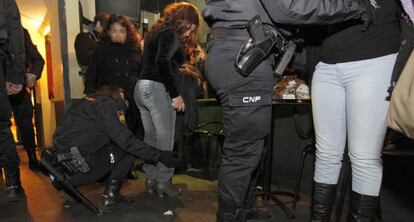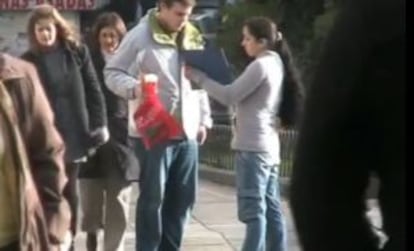Punishing the pickpockets
Public perceptions play a big role in the debate about tougher sentences for street theft Spanish courts are now issuing restraining orders to prevent offenders entering specific areas

They work in packs. They create a bottleneck, there’s a bit of pushing and shoving, and before anybody is the wiser, a wallet has been snatched, and on they move. Dubbed the bosnias, they are a notorious gang of women who have been picking pockets in the center of Madrid and Barcelona for the last decade. Well-known to the police and courts, they have been arrested dozens of times. And on each occasion, within hours they are back out on the streets, free to steal again. How come? Because under Spanish law, non-violent theft of amounts under €400 are not covered by the criminal code. However, after they robbed a tourist whose wallet contained €700, a Madrid court was last month able to slap a restraining order on four of the women, meaning that if they enter several streets and squares in the city center they face an immediate prison sentence.
This is not the first time that the Spanish courts have imposed these kinds of restrictions on repeat offenders. But their increasing use raises a number of legal and ethical questions. And then there is the matter of whether they actually work.
“Tourists who have their wallets stolen go back home with the idea that this country is very unsafe”
Víctor Moreno Catena, a professor of procedural law at Madrid’s private Carlos III University, has his doubts: “The law is not specific enough, meaning that it is open to the individual interpretation of judges: we have to remember that these kinds of measures came about through cases of gender-specific violence.”
This was highlighted last year, when the bosnias were banned from using Madrid’s metro, only for the ruling to be overturned shortly after by a higher court. The court said that not only was the measure disproportionate, but also that there was no specific victim who needed to be protected, as is the case with restraining orders.
Classic maneuvers
The bottleneck. A group of thieves divides into two and blocks the victim's way forward, thus distracting them. Meanwhile, a second group behind carries out the robbery. This might typically be coordinated on an escalator or at an entrance to a metro station by dropping something on the floor, and then creating a bottleneck while the victim recovers it, allowing one of the group behind to remove a wallet or purse from a bag. Normally, the person who takes the item immediately passes it on to another in the gang.
The stain. One member of the gang spills something on the victim's clothes, another calls the victim's attention to it, while a third comes forward with a handkerchief offering to help, and takes advantage of their proximity to steal the victim's wallet or purse.
The cape. When a metro carriage is crowded, and passengers are pressed up close, the thief covers one arm with a newspaper or coat, which hides their hand, allowing them to remove a wallet from inside a jacket, for example.
The petition. A member of the gang holding a clipboard approaches the victim asking them to sign a petition for a good cause. If the victim agrees, as the petitioner leaves, he or she hugs the victim in thanks, using this proximity to remove a wallet from their clothing. Variations include sitting down next to somebody at a pavement café to ask them to sign the petition, and at a moment in the conversation, putting the clipboard down over a cellphone or wallet. When they leave, they take the phone or wallet with them.
The police. A group of five or six thieves pass themselves off as police officers, telling the victim they need to search him. The typical target would be a tourist unfamiliar with Spanish police uniforms.
Furthermore, as Manuel Cancio, a professor of penal law at Madrid’s Autónoma University, points out, even that ruling failed to get to the nub of the matter: “The articles in the penal code and the Criminal Procedure Code that allow for such measures specifically refer to crimes, not offenses, which is the case with most of these kinds of thefts,” he explains. However, there is a key difference between previous restraining orders and the one handed down last month: the amount of money stolen was greater than €400, making it a criminal, rather than a civil, offense.
The public prosecutor’s office in Barcelona faces the same dilemma when requesting restraining orders on pickpockets, says a source there, adding that in most cases the amounts of money stolen are less than €400. Then there is the question of proportionality, and again, who the order is actually protecting.
Regardless of the doubts surrounding the use of restraining orders – which can be applied while a case is being investigated, or subsequent to a decision, along with a fine or whatever sentence is handed down – they are increasingly being used by courts. Five years ago, the first restraining orders against thieves were issued in a number of provincial cities in order to ban certain individuals from entering various department stores. Barcelona followed suit, at the request of the city’s police force, and several people were prohibited from using the metro. A few months ago, a judge in Málaga banned two pickpockets from going within 500 meters of the airport after they were found guilty of stealing a bag there containing €2,000.
Now, restraining orders have been applied in relation to entire streets and districts: aside from last month’s decision by a Madrid court, a year ago a judge in Palma de Mallorca banned a group of seven women known as the clavereras, who passed themselves off as flower sellers, from the center of the city, its beaches, and the seafront.
Having reached this point, the debate now goes beyond the application of the law and enters the realm of ethics: after all, somebody’s freedom of movement is now being restricted. Cancio says that as before, the issue is one of proportionality in relation to the infraction and the punishment. “I know that these are repeat offenders, but in the final analysis, the question is whether these pickpockets can be jailed [which is what would happen if they breached their restraining order]. Nobody likes having their wallet or purse stolen, but this kind of theft is covered by a certain legislation, and I don’t think that this kind of offense is worth putting somebody in prison for.”
Moreno Catena agrees: “Something has to be done: It is quite unacceptable that these people can be arrested up to 400 times and simply go back out and commit crimes, but we have to be very careful when it comes to restricting people’s freedom of movement, because of the practical difficulties in applying the punishment.”
And as Cancio points out: “These measures are meaningless: stealing wallets is illegal, but the authorities cannot stop it from happening; and the same will apply to these restraining orders.”
The police and public prosecutors see things differently, pointing out that there was a 40-percent drop in reports of theft on the metro during the period the bosnias were forbidden from traveling on it, before the provincial court lifted the ban.
The number of reports of minor thefts in Spain rose by 18.5 percent between 2009 and 2012
“This is something that will help to discourage pickpockets,” says Inspector Pere Pau Guillén of the Barcelona police force. He says that restraining orders are another tool that can be used by the special unit set up to deal with repeat pickpocket offenders: “Spain is generally a very safe country, but tourists who have their wallets stolen go back home with a completely different idea: that this country is very unsafe.”
He says that over the last five years, his unit has managed to reduce street theft by more than 18 percent by targeting organized groups, and in the case of individuals, by showing that they make their living in this way: “The key is that police, public prosecutors and the courts all work together. This means that the courts can impose short prison spells of say, two weeks, rather than a fine.”
Restraining orders have been shown to work on the metro – the pickpockets who make their living in this way move on somewhere else – but the courts and the police know that these orders can only be applied when somebody is caught for having stolen more than €400, which is still relatively rare. The courts are reluctant to issue restraining orders banning people from certain streets, seeing it is a major restriction on their freedom of movement. At the same time, even if somebody is preventing from using the metro, they can still get around by other means. Guillén says that while it may not be viable to ban people from streets, perhaps it might be worth exploring banning them from large public spaces such as parks.
The number of reports of minor thefts in Spain rose by 18.5 percent between 2009 and 2012, up from 8,413 to 9,975, according to official figures. These include both incidents of pickpocketing and shoplifting and do not distinguish between crimes and offenses.

But these statistics have been criticized by some academics. Alfonso Serrano, a lecturer in criminology at the UNED distance learning university, wrote a paper in 2011 questioning the reliability of police figures, pointing out that minor thefts have a huge impact on public perceptions of crime, regardless of the numbers.
Marina Sanz-Díez, a lecturer in criminal law at the Rey Juan Carlos University in Madrid, has also drawn attention to the importance of public perceptions of crime in relation to relatively minor offenses: “Theft of all kinds impacts particularly on feelings of public safety, conditioning anti-crime policies that in response to the social sense of alarm that has been created have become increasingly tougher,” she says in an article published last year about repeat offenders. In it she also warns against “the disproportionate toughening of penal responses” in relation to what she regards as relatively light offenses and argues that a lot of street crime is the “product of marginality, of lack of education and opportunity, of poverty, unemployment, or drug consumption. For this reason, anti-crime policies based solely on tougher punishments, imply at the very least an unfair distribution of the social cost.”
Cancio agrees that there is a danger public perceptions will push the courts to take a zero-tolerance approach, pointing out that in some countries, such as the United States and Argentina, there is legislation forbidding loitering that include fines and prison sentences, and asks: “Is that what we want here?”
Tu suscripción se está usando en otro dispositivo
¿Quieres añadir otro usuario a tu suscripción?
Si continúas leyendo en este dispositivo, no se podrá leer en el otro.
FlechaTu suscripción se está usando en otro dispositivo y solo puedes acceder a EL PAÍS desde un dispositivo a la vez.
Si quieres compartir tu cuenta, cambia tu suscripción a la modalidad Premium, así podrás añadir otro usuario. Cada uno accederá con su propia cuenta de email, lo que os permitirá personalizar vuestra experiencia en EL PAÍS.
¿Tienes una suscripción de empresa? Accede aquí para contratar más cuentas.
En el caso de no saber quién está usando tu cuenta, te recomendamos cambiar tu contraseña aquí.
Si decides continuar compartiendo tu cuenta, este mensaje se mostrará en tu dispositivo y en el de la otra persona que está usando tu cuenta de forma indefinida, afectando a tu experiencia de lectura. Puedes consultar aquí los términos y condiciones de la suscripción digital.









































